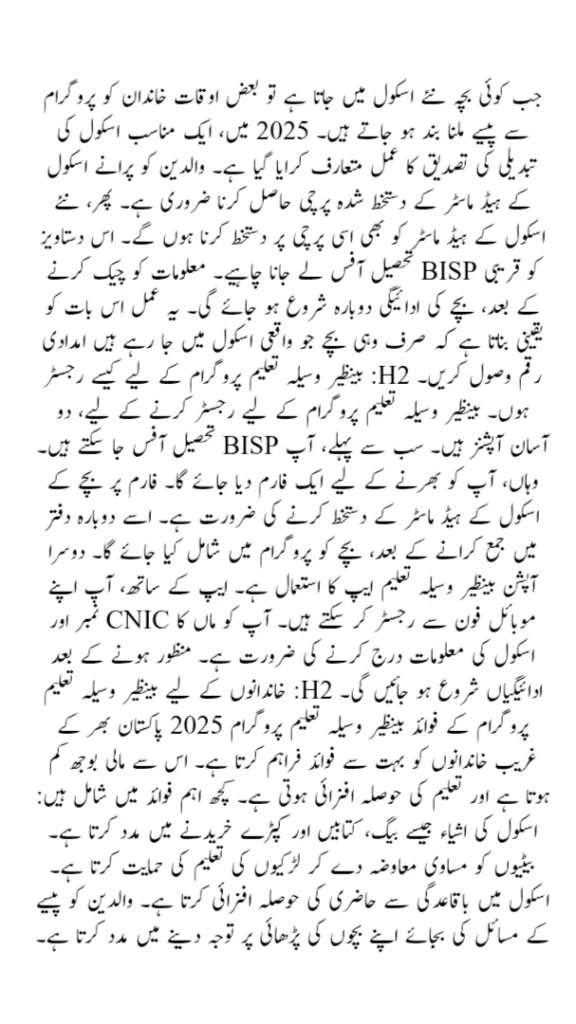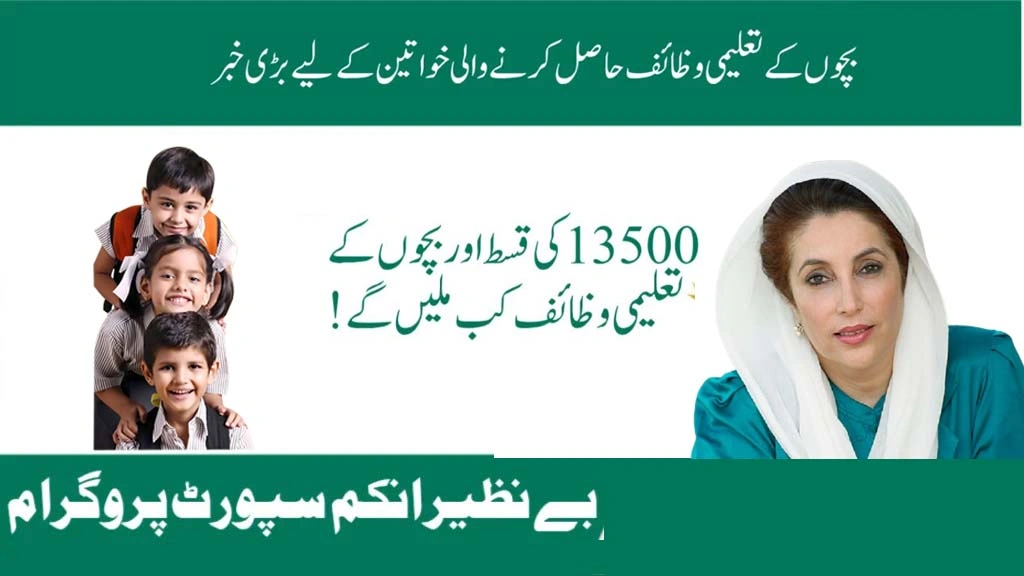The Benazir Waseela Taleem Program 2025 is a support initiative by the Government of Pakistan aimed at low-income families. It’s part of the larger Benazir Income Support Programme (BISP) and provides financial help to mothers so they can send their kids to school. The focus is on education — especially for girls — to reduce dropout rates and give every child a fair shot at a better life.
Why This Program Matters More Than Ever
In many parts of Pakistan, poverty forces kids to drop out of school. Books, uniforms, and even bus fare become too much to afford. This program solves that problem by offering PKR 4,500 per child every month. It’s not just money — it’s motivation for families to keep their kids in classrooms instead of at home or work.
Big Update for 2025: Increased Monthly Stipend
The biggest news for 2025 is the increased amount — now PKR 4,500 per child. That’s a significant bump, especially with rising inflation and school-related costs. This extra amount can help pay for:
-
School bags and stationery
-
Uniforms and shoes
-
Transport fares
-
Basic tuition expenses
This increase is designed to give poor families real relief and help students stay focused on their studies.
Who Is Eligible for the Waseela Taleem Program?
Only women who are already part of the Benazir Kafalat Program can enroll their children in this scheme. It’s specifically built to support mothers from struggling households, ensuring the money directly benefits the child’s education.
How to Enroll: Two Simple Ways
There are two main ways to register a child for this program:
1. Visit a BISP Tehsil Office
-
Collect the form from the office.
-
Have it signed by the head of the child’s school.
-
Submit it back at the same office.
2. Use the Benazir Taleem App
-
Download the app from your mobile store.
-
Enter the mother’s CNIC and child’s school details.
-
Wait for confirmation — once verified, the payment starts.
This app method saves time and makes registration easier, especially for rural and remote families.
How to Handle School Transfers
Transferring schools used to mean losing your stipend — not anymore. In 2025, a better verification process was introduced. Here’s how it works:
-
Get a Transfer Slip signed by the old school’s headmaster.
-
Have the new school’s head also sign it.
-
Submit this document to the nearest BISP office.
After proper checking, payments will resume. This way, children who change schools don’t have to miss out on the support they need.
Why Supporting Girls’ Education Is a Priority
The program equally supports both boys and girls, but it plays a crucial role in promoting girls’ education. In many areas, girls are the first to be pulled out of school when money is tight. With this support:
-
Parents are more likely to let daughters continue school.
-
Girls can study without worrying about costs.
-
Long-term, it builds a more educated and empowered generation of women.
Attendance Matters: Stay in School, Keep Getting Paid
There’s a catch — children must attend school regularly to keep receiving the monthly stipend. Schools are required to report attendance, and long absences can lead to a pause in payments. This condition encourages daily learning and discourages misuse of funds.
Benefits for the Whole Family
This program is not just about helping kids; it’s about helping entire families. The benefits include:
-
Reduced financial stress
-
Motivation to value education
-
Better future job prospects for children
-
Hope for escaping the cycle of poverty
When kids go to school, parents worry less, and families can dream bigger.
Challenges the Program Still Faces
While the Waseela Taleem Program is a great initiative, there are still some hurdles:
-
Fake registrations using incorrect information
-
Delays in payment due to incomplete paperwork
-
Low awareness in rural areas
-
Limited digital access for app registrations
Fixing these issues can make the program even stronger and reach more deserving families.
Also Read: 8171 Portal May 2025: What’s New in Payments & Eligibility Criteria?
Future Goals and Government Plans
Looking ahead, the government aims to:
-
Improve the mobile app for faster registration
-
Add biometric verification to prevent fraud
-
Work with schools to improve teaching quality
-
Expand the program to more families
It’s not just about money anymore — it’s about creating a stronger education system that benefits everyone.

Easy Tips for Parents to Stay Eligible
If you’re part of the program, here’s how to stay on track:
-
Keep your child’s school info updated
-
Make sure they attend school regularly
-
Keep copies of all forms and receipts
-
Use the app to check your status regularly
These small steps ensure uninterrupted payments and continued support.
How Local Communities Can Help
Community members, teachers, and social workers can help spread awareness about the program. Encouraging families to enroll and guiding them through the process can increase the impact.
-
Share updates in local gatherings
-
Help neighbors download and use the app
-
Encourage school staff to assist with form-filling
When the whole community supports education, everyone benefits.
Conclusion
The Benazir Waseela Taleem Program 2025 is more than just a government policy — it’s a lifeline for thousands of poor families. With increased payments, easier registration, and better verification systems, it’s changing how families see education. By removing the financial burden, the program gives kids a real shot at a brighter future. But for it to succeed long-term, transparency, awareness, and quality education must go hand in hand. When every child can stay in school and learn well, Pakistan moves one step closer to a more educated and equal society.
FAQs
1. How much money do families get per child in 2025?
Families receive PKR 4,500 per child every month under the updated 2025 program.
2. Can I register using my phone?
Yes, just download the Benazir Taleem App, enter your details, and submit the registration form.
3. What if my child changes school?
You’ll need a signed Transfer Slip from both the old and new schools and submit it to the BISP office.
4. Is this program only for girls?
No, it supports both boys and girls equally, but it’s especially helpful for encouraging girls’ education.
5. What happens if my child stops going to school?
If a child’s attendance drops, the monthly stipend can be paused or stopped until regular attendance resumes.

